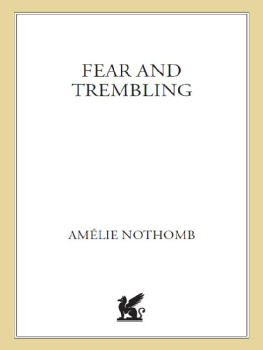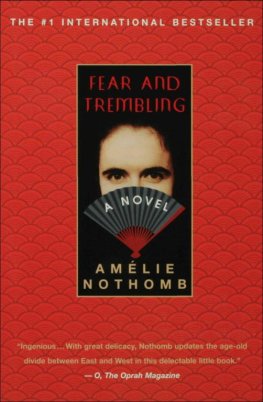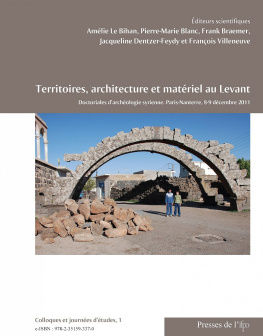Translated
by Adriana Hunter

ST. MARTINS GRIFFEN

NEW YORK
FEAR AND
TREMBLING
Amlie Nothomb
FEAR AND TREMBLING . Copyright 1999 by Editions Albin Michel S.A. Translation copyright 2001 by Adriana Hunter. All rights reserved. Printed in the United States of America. No part of this book may be used or reproduced in any manner whatsoever without written permission except in the case of brief quotations embodied in critical articles or reviews. For information, address St. Martins Press, 175 Fifth Avenue, New York, N.Y 10010.
www.stmartins.com
Library of Congress Cataloging-in-Publication Data
Nothomb, Amlie
[Stupeur et tremblements. English]
Fear and trembling / Amlie Nothomb ; translated by
Adriana Hunter
p. cm.
ISBN 0-312-27218-9 (hc)
ISBN 0-312-28857-3 (pbk)
I. Hunter, Adriana. II. Title.
PQ2674.0778 S7813 2001
843.914dc2I 00-045967
First published in France under the title Stupeur et tremblements by Editions Albin Michel S.A.
10 9 8 7 6 5
Contents
MISTER HANEDA WAS senior to Mister Omochi, who was senior to Mister Saito, who was senior to Miss Mori, who was senior to me, I was senior to no one.
You could put this another way. I took orders from Miss Mori, who took orders from Mister Saito, and so on up the ladder; of course, orders that came down could jump a level or two.
And so it was that, within the import-export division of the Yumimoto Corporation, I took orders from everyone.
ON THE 8th of January in 1990 an elevator spat me out on the top floor of a towering Tokyo office building. An enormous bay window at the far end of the landing sucked me over with the irresistible force of a shattered porthole on an airplane. Far, very far, below, I could see the city; it seemed so distant and unreal from that height that suddenly I wasnt sure I had ever even set foot there.
It didnt occur to me that I ought to introduce myself at the reception desk. Actually, at that moment, I didnt have a single thought in my head, nothing aside from fascination with the endless space outside the great bay window.
Eventually a hoarse voice from behind pronounced my name. I turned around. A small, thin, ugly man in his fifties was looking at me irritably.
Why didnt you let the receptionist know that youd arrived? he asked.
I couldnt think of anything to say. I bowed my head and shoulders, realizing that in just ten minutes, and without having spoken a single word, I had made a bad impression on my first day at Yumimoto.
The man told me he was Mister Saito. He led me through huge, endless, open-plan offices, introducing me to hordes of people whose names I forgot as soon as he had pronounced them.
He showed me the office that was the domain of his superior, Mister Omochi, who was enormously fat and terrifying, proving that he was the vice-president of the division.
Then he indicated a door and announced solemnly that behind it was Mister Haneda, the president. It went without saying that I shouldnt even dream of meeting him.
Finally he led me to a gigantic office in which at least forty people were working. He indicated a desk, which sat directly opposite from another desk, belonging, he informed me, to my immediate superior, Miss Mori. She was in a meeting and would join me in the early afternoon.
Mister Saito introduced me briefly to the assembly, after which he asked me whether I enjoyed a challenge. It was clear saying no would not be an option.
Yes, I said.
It was the first word I had spoken. Until then, I had made do with tilting my head.
The challenge that Mister Saito was proposing consisted of accepting an invitation on his behalf from someone named Adam Johnson, to play golf the following Sunday. I was to write a letter of acceptance to this gentleman in English.
Who is Adam Johnson? I was stupid enough to ask.
My superior sighed exasperatedly and didnt answer. I wondered whether it was absurd not to know who Mister Johnson was. Was my question indiscreet? I never found out, nor ever learned who Adam Johnson was.
The exercise seemed simple enough. I sat down and wrote a cordial letter, something along the lines of Mister Saito would be delighted to play golf next Sunday with Mister Johnson, and sends him his best regards, etc, etc. I took it to Mister Saito.
He read my work, gave a scornful little cry, and tore it up.
Start over.
I thought I had perhaps been too friendly or familiar with Adam Johnson, and composed a cold, formal reply. Mister Saito acknowledges Mister Johnsons request and wishes to inform him of his willingness to conform with his desires by engaging in a game of golf with him, etc, etc.
He read my work, gave a scornful little cry, and tore it up.
Start over.
I wanted to ask what I had done wrong, but it was clear Mister Saito did not tolerate questions, as had been proved by his reaction to my brief inquiry into the identity of the letters recipient. I would, therefore, have to find for myself the correct phraseology with which to address this mysterious golfer, Adam Johnson.
I spent the next few hours composing missives. Mister Saito punctuated my output by tearing it up, with no other commentary than that same little cry; it became a sort of refrain. Each time I had to come up with a new formula.
There was something Fair duchess, I am dying of love for you about this whole exercise that demanded a certain amount of creative wit. I explored permutations of grammatical categories. What if Adam Johnson were the verb, next Sunday the subject, playing golf the object, and Mister Saito the adverb? Next Sunday accepts with pleasure the invitation to go Adamjohnsoning a playing golf MisterSaitoingly. Take that, Aristotle!
I was just beginning to enjoy myself when Mister Saito interrupted me. He tore up the umpteenth letter without even reading it and told me that Miss Mori had arrived.
You will work with her this afternoon. In the meantime, go and get me a cup of coffee.
It was already two oclock in the afternoon. My epistolary exercises had so absorbed me that I had forgotten about taking a break.
I put the cup down on Mister Saitos desk and turned around. A young woman as tall and slender as an archers bow was walking toward me.
Whenever I think of Fubuki Mori, I see the Japanese longbow, taller than a man. Thats why I have decided to call the company Yumimoto, which means pertaining to the bow.
And whenever I see a bow, I think of Fubuki.
MISS MORI ?
Please, call me Fubuki.
Miss Mori was at least five feet ten, a height few Japanese men achieved. She was ravishingly svelte and graceful despite the stiffness to which she, like all Japanese women, had to sacrifice herself. But what transfixed me was the splendor of her face.
She was talking to me. The sound of her soft voice brimmed with intelligence. She was showing me some files, explaining what they contained, and smiling. I was dimly aware that I wasnt listening to what she was saying.
Then she invited me to read the documents she had placed on my desk, which, as Ive said, was opposite hers. She sat down and started to work. I leafed meekly through the paperwork. It dealt with rulings and listings.
 ST. MARTINS GRIFFEN
ST. MARTINS GRIFFEN  NEW YORK
NEW YORK








